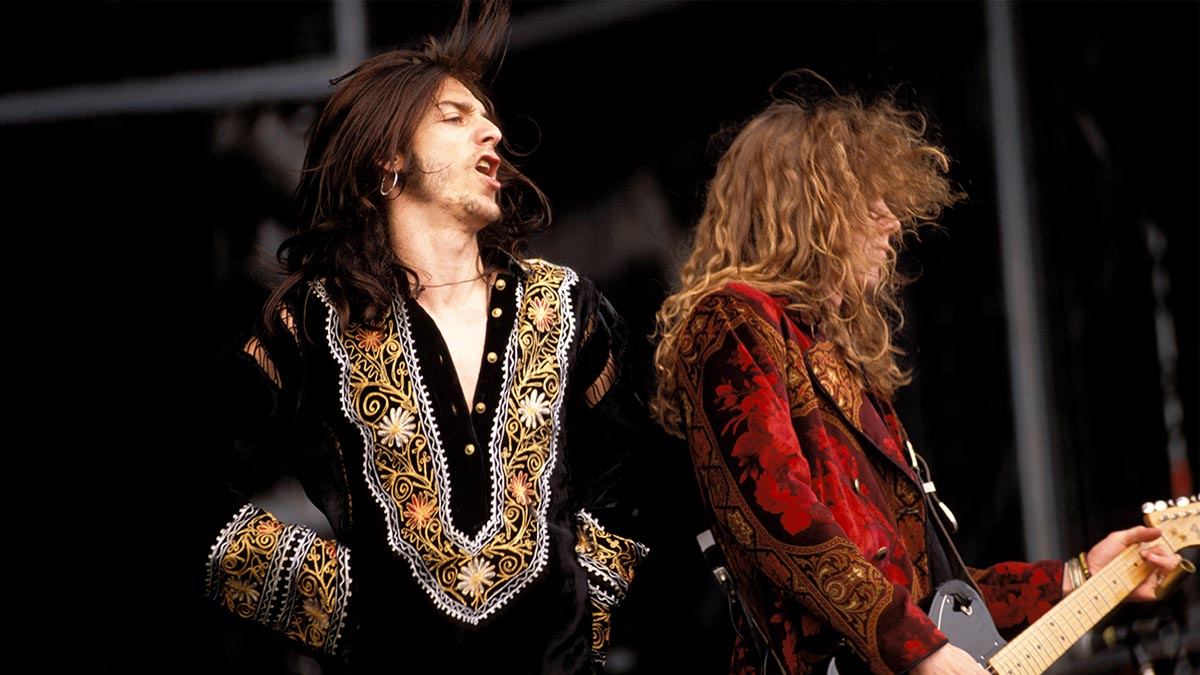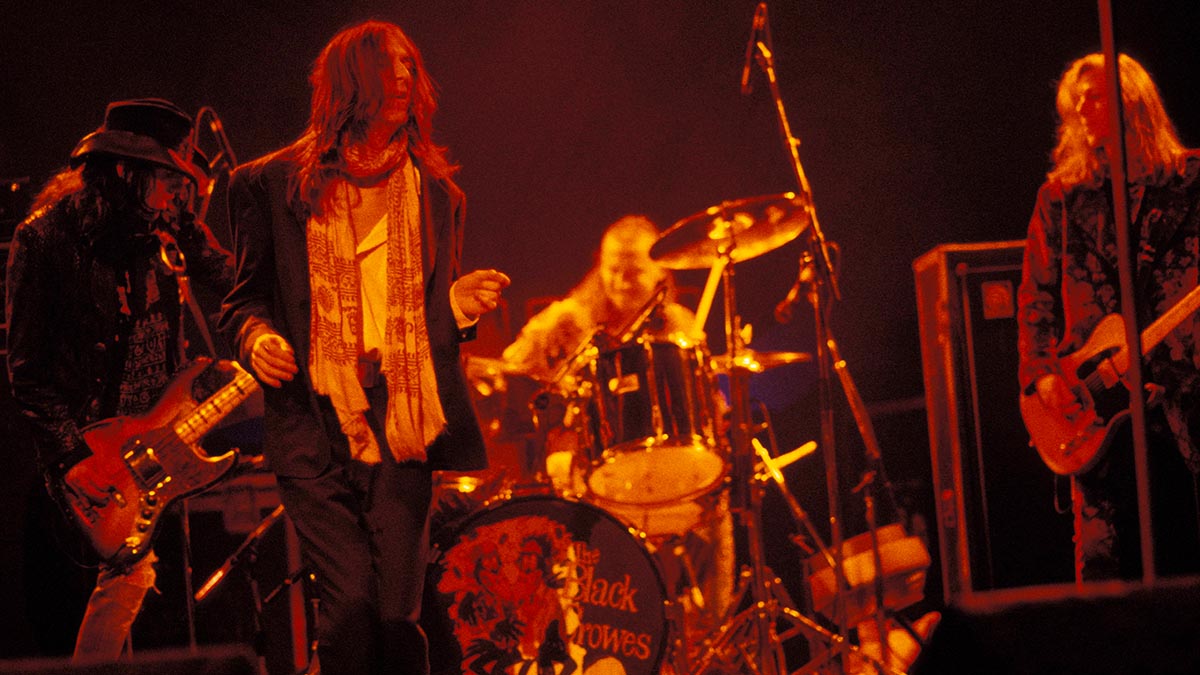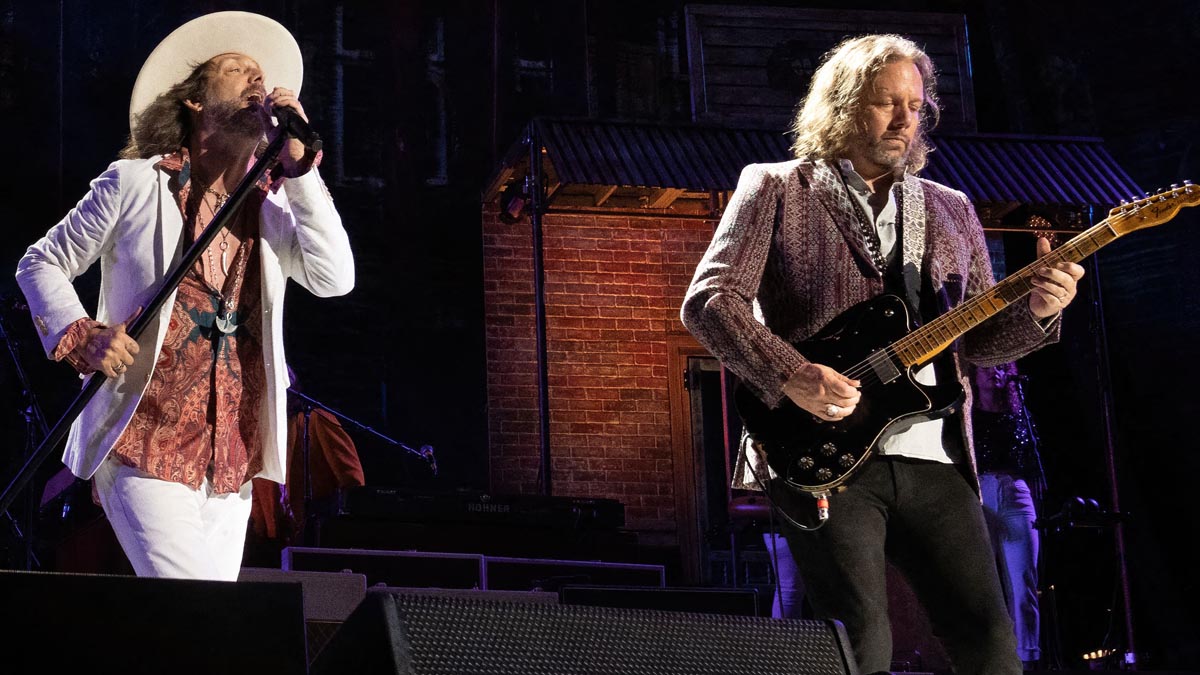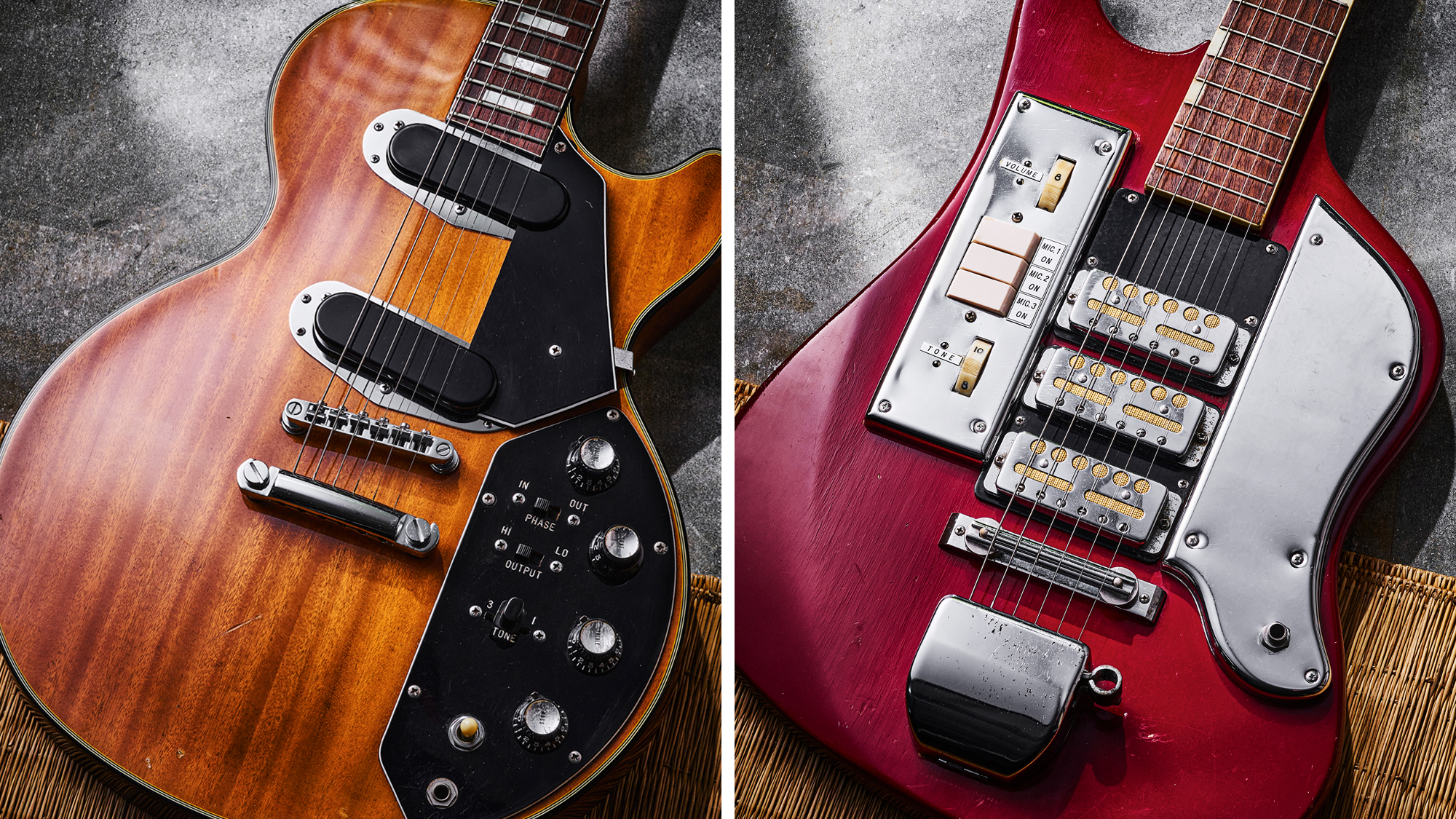The Black Crowes’ Chris and Rich Robinson on 30 years of Shake Your Money Maker
How the Atlanta rockers’ 1990 debut set the table for a career that distilled rock ’n’ roll to its quintessence, and brought soul, blues and a sense of ambition into the mix

At the start of 2020, Chris Robinson and his brother Rich were anxiously preparing for a massive world tour to celebrate the 30th anniversary of their multi-platinum debut, 1990’s Shake Your Money Maker.
The brothers had reconciled the year prior after several years not talking to each other, mostly due to a dispute over band ownership. They assembled a new version of the band, and initial performances appeared to reaffirm their passion for playing once again as the Black Crowes. However, COVID swiftly postponed future plans.
But the Robinson brothers didn’t sit idly by. They teamed up with original producer George Drakoulias to create a remastered version of the album – which features the hits Jealous Again, Twice As Hard, She Talks to Angels and a cover of Otis Redding’s Hard to Handle – and dug into the vaults for material from their early days.
Expanded versions of 2021’s The Black Crowes Present: Shake Your Money Maker also include a collection of B-sides, demos and unreleased material – some dating back to their early incarnation as Mr. Crowe’s Garden – as well as a recording of their spirited 1990 show in their hometown of Atlanta. The extra time gave them a chance to reminisce further on the album and see how far they’d come.
As Chris says, it made them realize “how amazing and lucky we are to have created some music and been in a band that has perpetuated a career that’s gone on for three decades. That people would be interested in your music and what you have to say.
“It reaffirmed my loud and passionate belief of ‘nothing is the same,’ but the way we feel about rock and roll is the same,” he says. “And it’s funny too – the good, the bad, the ugly, the joyous, the lazy, the whatever – that the Black Crowes were on the outside. On the inside, where Rich and I were coming from… [we were] always putting the music in its proper… giving it proper gravity, its weight.”
The band has grown considerably from where they were at the start of the album’s sessions. At the end of the '80s, they weren’t on a label, didn’t have a manager, and money was scarce. Rich was 19, a year out of high school and still living with his parents. Chris was in his early 20s, still trying to find his way.
Get The Pick Newsletter
All the latest guitar news, interviews, lessons, reviews, deals and more, direct to your inbox!
“We had no money at all. We were hungry, like literally,” Chris says. “But I think we knew this was an opportunity that was special. We’d been working very hard the years leading up to that. A couple of years, really. We wanted to get in the game. We wanted to get on the field, and we wanted to make a record. We wanted to tour the world. We wanted our shot.”
Adds Rich, “We looked at the record like that was everything. Like we had arrived. We were all so excited just to be able to get into the studio and record these songs.”
They credit Drakoulias for taking a chance on a young band and becoming their point man for all things business.
“George really believed in us when no one else did. And that was really important back then. Before you made anyone any money in the music business, very few people really gave a shit,” Chris says. “George did, and he saw something in us and believed in us. And he also instilled a work ethic that we have to this day, about the songwriting, and when you have good songs, it makes everything a lot easier. Songwriting always comes first. No matter what, and no matter what it seemed like.”
Drakoulias and the band were introduced around 1986 through demos the band was doing for A&M. Drakoulias heard about them through conversations within the label. On a whim, he decided to catch their show at a New York City club.
“We met him there, and he really liked the covers we chose,” Rich says. “We did Down in the Streets and an Aerosmith song called No More No More. And George was like, ‘Wow, that’s a cool combination.’ I think he really saw something in the music we liked and the music we chose to add. I don’t know how much he thought of our own songs, but I think he saw something there and took us under his wing, and tried to sign us to A&M.
I love the sincerity of what we were trying to do.
Chris Robinson
“We were all really young and excited about what could be, but we had no idea that anyone would really like what we were doing,” he continues. “If you look at what was happening in music at the time, it was bands like Warrant and Slaughter and Poison, and all of these kinds of hair metal bands. We were doing an Otis Redding song… So, it was more just really for the love of music and for the excitement of us to be able to get into the studio and make a record.”

The remastered version of the album is like a time machine for the brothers. The band was pleasantly surprised to rediscover songs such as Charming Mess, which was slated to be the band’s first single but was left off the album.
“It’s like digging up the time vault in front of the elementary school in the year 2053. Like, ‘Oh my god,’” Chris says. “I was surprised about how ambitious we were, to try to play [John Lennon’s] Jealous Guy and 30 Days in the Hole. I love to see the demos for Front Porch Sermon and Angels.
“I love the sincerity of what we were trying to do. And it’s just interesting to see something that’s not fully formed. I mean, of course, the record is fully formed, but all the little parts leading up to it, in the year before, the year and a half before we’re in the studio. It’s just cool to see where the trajectory ends up taking us.”
Adds Rich, “I think the version of She Talks to Angels that’s on the box set was the demo version we had sent to George…. I totally forgot we had recorded [an early version of] Jealous Guy. I remember us playing it a few times at shows when we were younger, but I don’t ever remember recording it, and then I heard it and I was like, ‘Oh yeah.’ It just came straight back… It can be pretty funny sometimes to kind of check out a moment in time, like a little flash in time where you see the start of something and where it ends up.”
Guitars Take Flight
Even in their early days, the Robinson brothers knew they wanted, as Chris says, to be a “guitar-based rock ’n’ roll band, in the classic sense.” At the time, Rich would write most of the guitar parts and Chris would add lyrics and melodies. Drakoulias and engineer Brendan O’Brien, who has experience as a guitar player, were helpful for Rich and original guitarist Jeff Cease in getting the right tones.
“One thing that was really important to us was to have guitar tones that we loved,” Chris says. “They were probably, at the time, seen as out of touch. We didn’t sound like a heavy metal band. We didn’t sound like hair metal. We didn’t sound like this or that. We loved the Rolling Stones and the Faces. We loved AC/DC and Aerosmith, Free and Humble Pie. Mick Ralphs and Mott the Hoople. And we wanted these guitar tones.
We loved the Rolling Stones and the Faces. We loved AC/DC and Aerosmith, Free and Humble Pie. Mick Ralphs and Mott the Hoople. And we wanted these guitar tones
Chris Robinson
“We weren’t really concerned with it being different,” he adds. “We weren’t concerned with people saying, like, ‘Oh, that’s like the '70s or the '60s or whatever.’ We just were trying to do the best we could in the moment.”
In those days, the band’s gear was much more limited compared to future releases. “We didn’t have a lot of gear, so we had to make everything work in the dynamic that we possessed,” Chris says. “I liked the idea of not having everything at your disposal and really working hard to make what you have work.”
While he later learned to play guitar, Chris was solely focused on songwriting for the band’s early albums. Says Chris, “I’m the frontman. I have to open for Robert Plant and Steven Tyler within four months of each other. So, I had my own trip to deal with.”
For Rich, the sessions helped him be able to tell the “difference in how guitars sound and how they feel and what they’re going to bring to the table.” He wrote riffs for songs on whatever guitar he had available.
“I was always more focused on writing songs at the time, but I’ve never been one to obsess or to laboriously go over scales or do these things,” Rich says. “I always picked up guitars when I was moved to pick the guitar up, and therefore I was always moved to write a song… when I felt inspired to do so. Therefore, every time I picked up a guitar, it always made me feel happy and inspired, and that’s how I am today.”
He had four guitars at the time – a black custom Fender Telecaster that had an oversize humbucker in the neck position, a Blonde Telecaster that he traded for a Goldtop and a 1953 Martin D-28 that his father had loaned him. His parents also bought him a Silver Jubilee half-stack amp after graduation. “Each one served a different purpose,” he says. “I wound up using mainly the Blonde Tele and the Goldtop.”
Regardless of the guitar, he excelled in keeping the rhythm. “What Rich didn’t have as a flashy lead guitar player, he had in spades as a rhythm player, and as the person responsible for the composition,” Chris says.
Adds Rich, “One of my first guitar heroes, when I was much younger, was Angus [Young]. And the funny thing is, like, listening to Shake Your Money Maker, there is a lot more AC/DC on there than I remember. A lot of the rhythmic parts were doubling each other instead of more [of the] guitar interplay that we got into on later records, like Southern Harmony and Amorica where Mark Ford and I would kind of break off and do these things.”

The songs on Shake Your Money Maker are richly textured, thanks to the band’s use of several different types of guitars. Jealous Again features Rich’s Blonde Tele. Stare it Cold finds Rich playing in open-G tuning to achieve, as Chris puts it, “ringy strings.” He’d been playing open G for about six or eight months. For She Talks to Angels, Rich used the Martin D-28, which echoes his early folk days. But the Tele was the star.
“It had that thing that only Teles can really do,” Rich says. “I use the Tele for mostly the open-tuning stuff, and I use my Goldtop for things like Hard to Handle and Could I’ve Been So Blind. For whatever reason, I guess the Tele held the tunings a little bit better, but ultimately, the sound of those two instruments couldn’t be further apart, but they work really well together. So, it was just kind of out of necessity. That’s what we brought, so that’s what we recorded the songs with – but they worked.”
Lasting Impact
31 years later, Rich and his brother have come to realize how big an impact their work on Shake Your Money Maker has had on other musicians.
“It catches me off guard in a good way, just to hear that the way I played or the way I wrote actually influenced someone,” Rich says. Chris is excited to see whenever “[our] music has retained any of that kind of shine that people can pick up on, and then make a little more shining thing.
“I think ultimately that’s the tradition we work in,” he says. “Because we’re inspired, and we’re influenced by things we feel on an emotional level. And then, realistically that’s what we want to put out there. All the other stuff is just, like, the way of the world.”
“We’ve taken 30 years to realize it, but Rich is like me. We both like to make stuff and songs are like making something,” Chris says. “People like to go fuck around with their engine in the garage, or build a deck on their house or whatever. We like to work and write songs. And there’s great craft in that. I think we have an understanding of what kind of time and commitment that craft takes.”
One of their favorite moments is when Prince came to the Fox Theatre in Atlanta in the early '90s and performed Jealous Again. “To have him play one of our songs was far out,” Rich says. “Those things are amazing – to hear people that we loved and appreciated. Before George Harrison passed away [in 2001], he had said some complimentary things about us, which was incredibly humbling and flattering. So yeah, those things are always amazing.”
People like to go fuck around with their engine in the garage, or build a deck on their house or whatever. We like to work and write songs
Chris Robinson
While the band’s main focus is to get back on the road (and they are indeed booked through mid-November as of this writing), Chris and Rich have begun to work on sketches that have the potential to become new Black Crowes songs.
“Rich and I started working on new music, and George [Drakoulias] has been working with us. It’s been amazing to have George, to have his ear, to have his knowledge and depth about the songs,” Chris says. “We’re not in a hurry. We have no plans to record anything. We’re just writing and writing. It’s really come full circle in terms of that as well.”
- Shake Your Money Maker 2020 is out now via American Recordings.
Josh is a freelance journalist who has spent the past dozen or so years interviewing musicians for a variety of publications, including Guitar World, GRAMMY.com, SPIN, Chicago Sun-Times, MTV News, Rolling Stone and American Songwriter. He credits his father for getting him into music. He's been interested in discovering new bands ever since his father gave him a list of artists to look into. A favorite story his father told him is when he skipped a high school track meet to see Jimi Hendrix in concert. For his part, seeing one of his favorite guitarists – Mike Campbell – feet away from him during a Tom Petty and the Heartbreakers concert is a special moment he’ll always cherish.
“You run scales so when inspiration and instinct kicks in you're able to keep up with it”: Larkin Poe's Rebecca Lovell explains her “hunt and peck” approach to guitar solos – and how scales can make all the difference
“I wanted to play more, and it was inappropriate with Eric or Roger. I was not the lead guitarist, and I wanted to be”: Clapton, Waters, Satriani and me – Andy Fairweather Low on his greatest collaborations and finally taking center stage











